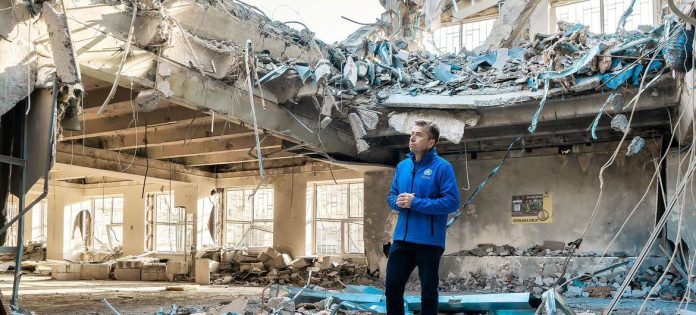Reporting from Zaporizhzhya on the front line in eastern Ukraine, Tom Fletcher stated that air strikes are still ongoing and causing significant civilian casualties.
During his time in the city – which is near Europe’s largest nuclear power plant of the same name under Russian control – the Emergency Relief Coordinator visited the location where a missile struck a medical clinic last month, resulting in the destruction of the facility and civilian casualties.
Mr. Fletcher highlighted how Ukrainian communities are supporting each other and emphasized the need for the international community to do the same.
Due to the extensive destruction above ground, schools have been reconstructed several meters below the surface to protect children and teachers from the ongoing conflict, allowing approximately 1,000 children to receive education daily in Zaporizhzhya.
He also toured a collective site for displaced individuals in Dnipro, witnessing the aid efforts at a transit center in Pavlohrad, as reported by the Office for the Coordination of Humanitarian Affairs (OCHA).
Humanitarian plan for 2025
Mr. Fletcher is scheduled to visit Kharkiv on Thursday, where he and the head of the UN refugee agency, UNHCR, Filippo Grandi, will launch this year’s humanitarian and refugee response plans for Ukraine and the region. They are set to address the media jointly from the capital Kyiv prior to the launch.
Last year, UN aid teams and numerous partners provided humanitarian assistance to over eight million individuals. This included support for nearly 364,000 people with winter-related relief by November, such as energy, non-food supplies, and healthcare.
Guterres commemorates victims of Haiti earthquake
UN Secretary-General António Guterres recently paid tribute to the victims of the devastating earthquake that struck Haiti on January 12, 2010, claiming the lives of hundreds of thousands.
In a briefing in New York, UN Spokesperson Stéphane Dujarric shared that the Secretary-General remembers the earthquake victims and honors their legacy through the UN’s work in Haiti. He also acknowledged the 102 UN staff members, including the head of the Mission, Mr. Hédi Annabi, who lost their lives in the tragedy.
MINUSTAH
The 2010 earthquake caused destruction across Haiti’s capital Port-au-Prince. (file)
Three million impacted
An estimated three million people were affected by the earthquake, leading to significant humanitarian, protection, health, displacement, and infrastructure challenges in Haiti that persist to this day.
A ceremony was held in Port-au-Prince to honor the earthquake victims and UN staff members who lost their lives. The head of the UN political office in Haiti, Maria Isabel Salvador, expressed solidarity with those still impacted by the tragedy and praised the resilience of the Haitian people.
$82 million pledged to Sudan’s struggling healthcare system
The World Bank, WHO, and UNICEF recently signed an $82 million agreement called the Sudan Health Assistance and Response in Emergencies (SHARE) to enhance critical service access for over eight million Sudanese individuals.
Currently, more than 70% of hospitals and health facilities in conflict-affected areas are not operational due to lack of supplies or damage sustained during the conflict, according to WHO.
UNICEF Representative for Sudan Sheldon Yett stated that essential social services for vulnerable children and families in Sudan are on the verge of collapse, with frontline workers going unpaid for months.
Health services in shambles
Delivery of vaccine supplies and routine immunization efforts have been hampered by security concerns and limited access. Disease outbreaks risk exacerbation due to inadequate access to safe water and sanitation.
About 3.4 million children under five are at high risk of diseases like measles, malaria, pneumonia, diarrhea, and cholera. Through SHARE, UN agencies aim to provide essential medicines, train health workers, address severe malnutrition, enhance vaccination campaigns, and improve disease surveillance systems.
WHO Representative in Sudan Dr. Shible Sahbani emphasized the importance of investing in preparedness and resilience to build a stronger and more sustainable health system.




